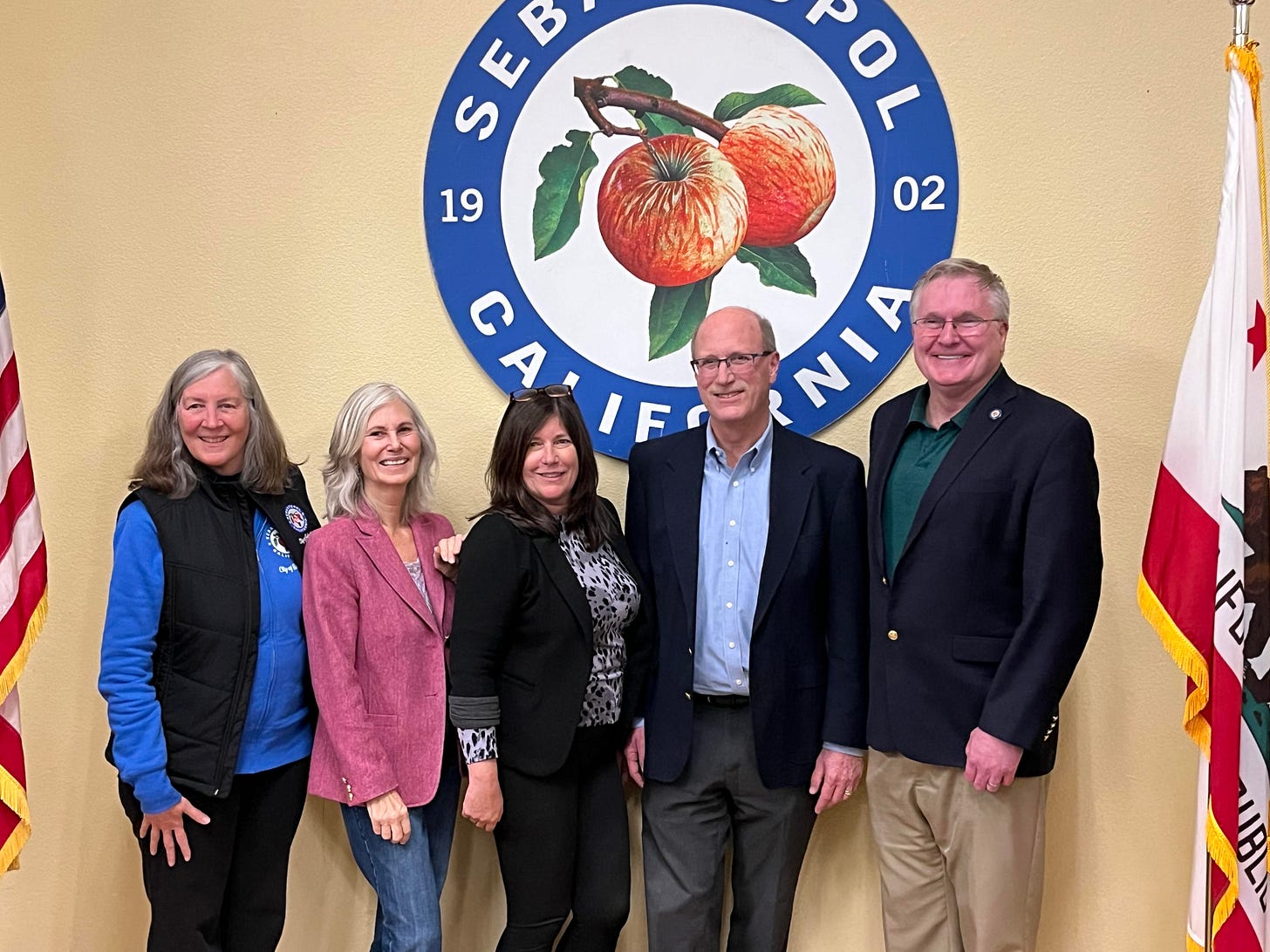Council rejects parcel tax, but declares financial emergency
Recap of the November 21 Sebastopol City Council Meeting
Mayor Neysa Hinton, Vice Mayor Diana Rich, Councilmember Sandra Maurer and Councilmember Stephen Zollman were present at the Nov. 21 Sebastopol City Council meeting. Councilmember Jill McLewis was absent.
Public comment for items not on the agenda
Three speakers, including Rachel Marcus and Tariq Kanaana, requested that the city make a proclamation or resolution requesting a ceasefire in Gaza. Kate Haug called on the council to create goals for immediate and longterm economic development—including keeping Head West at the Barlow, supporting efforts of the Chamber and the Sebastopol Downtown Association, connecting the Barlow to the town square via strings of lights, and other ideas. Kyle Falbo commented that the city was suffering from a crisis in public engagement caused in part by inadequate noticing of public meetings and the inaccessibility of city government.
Consent Calendar
(Note: The consent calendar consists of items that are routine in nature or don’t require additional discussion, often because they’ve been discussed extensively at a previous council meeting.)
There was only one item on the consent calendar. The council voted 4 to 1 (with councilmember Lewis absent) to add Fehr and Peers to the city’s pre-qualified list of consultants to perform engineering services in the following disciplines: street improvements planning and design, and traffic engineering.
Regular Agenda
Declaring a fiscal emergency
A council majority made up of Mayor Neysa Hinton, Vice Mayor Diana Rich and Councilmember Stephen Zollman voted to approve “a declaration of a fiscal emergency.”
This was opposed by Sandra Maurer and a host of speakers during public comment, who argued, among other things, that it would damage the reputation of the town and discourage businesses from opening or relocating here.
Councilmember Rich explained her support of the declaration this way: “I continue to feel that we are in a fiscal emergency. We have a situation where we have projections of $1.67 million this year as a deficit and continuing on to the future. We have $5.1 million in reserves coming into this year, which is fabulous, but if you do the math, we run out of that amount of money pretty quickly at $1.5, $1.7 million clip so by July of 2026 we are facing a cliff. I am of the opinion that we need to embrace that reality and that we need to not shy away from it.”
Both Councilmember Maurer and public commenter Kyle Falbo challenged the city’s budget numbers, arguing that ultra-conservative forecasting had created the illusion of an emergency where there was none.
Maurer repeatedly emphasized the size of the city’s reserves, while Hinton and Rich argued that this temporarily large reserve was due to one-time windfalls, which can’t be relied on into the future.
In the end, the council voted 3 to 2 in favor of the declaration of a fiscal emergency, with Councilmember Maurer opposed and Councilmember McLewis absent.
Earlier in the discussion, after a bruising public comment session on this topic, Mayor Hinton asked to declare a “Kindness Emergency.”
“We are on Thanksgiving week, and I really would appreciate, while we have discourse and that's what this room can be about, I think the personal punches are really hard to take. So I think that we are Peacetown, and we should be a little kinder when we make public comment.”
Changing their minds about a parcel tax
The real surprise of the evening was that the council, which seemed poised to vote to put a parcel tax on the March 2024 ballot, stepped back from that decision.
Whether this was based on a shift in their personal opinions or shaped by the withering comments during public comment on this topic, first Hinton and then Rich declined to support a parcel tax, leaving Zollman as the sole supporter of this unpopular measure.
“This one is super tough for me,” Hinton said. “But at the end of the day, I don't think I'm going to be supporting a parcel tax tonight. I know we need revenue, and I fully support and understand that we are in a fiscal emergency. I co-authored a presentation for a sales tax measure back in July, and I continue to believe that a sales tax measure shares the love with our neighbors…and it does help us solve our entire problem if we were to go for a half cent sales tax.”
She acknowledged that there currently wasn’t enough support on the council to put a sales tax measure on the ballot, but hoped that might change under the tutelage of a new city manager.
“I do hope that this year with the guidance from our new city manager and a new budget subcommittee and looking at this math that we will all feel confident in the numbers moving forward and we'll be able to get a tax measure that will be supported.”
Vice Mayor Rich also said she was torn, but summed up her brief remarks with this: “I don’t think a parcel tax at this point for this community is a good idea.”
Maurer was visibly relieved.
“I'm really relieved that we will not be moving a parcel tax forward,” she said. “I did not support it. I did not want to spend the money on it. And I think that waiting until November is a good idea. At that time, we'll only need a simple majority to pass whatever measure we're going to be putting forward.” (For technical electoral reasons, if they had run the parcel tax in March, it would have required a two-thirds majority to pass.)
Council approves the contract for Don Schwartz as the new city manager
The council approved the hiring of Don Schwartz as city manager. As a part of his three-year contract, Schwartz will make $245,000 a year, in addition to full benefits, a $350-a-month car allowance and a few other perks.
Assistant City Manager Mary Gourley explained that there were 35 applications for the position, but that “Don had the credentials and the experience most consistent with the needs of this position, and we're welcoming him to the city tonight.”
Schwartz and his family were given a warm welcome by a relieved and almost giddy council. Councilmember Maurer opined that if this was a diving competition, they’d all be holding up cards with the number 10 on them.
“I just want to emphasize that this was a unanimous decision,” Maurer said.
Rich concurred. “I just have to just recognize your incredible depth of expertise and experience,” she said, “and, looking at our fiscal crisis, knowing what you've done in Rohnert Park with your fiscal plan there and your deep dives into those issues and your ability to kind of bring people together; the resume and the CV is just so impressive and your reputation, I'm like, yeah…10,10, 10! So many people have reached out to me and said, ‘Wow, you got Don Schwartz?! Cool!’ So thank you very much and welcome to Sebastopol.”
For his part, after thanking his family for their support, Schwartz told the council, “There are certainly challenges ahead. Tonight's good evidence of that. And my promise to you is to be mindful of, for me, deeply held personal values and taking those on: that includes integrity and telling you the truth as I see it. It includes fiscal responsibility and honoring the taxpayers and the ratepayers and their dollars and treating them respectfully. And it includes collaboration. That means working together well with you, with the fine staff, and with the community. And when I do that, it will always be with the intent of keeping in mind the best longterm interests for the residents of Sebastopol. So again, thank you for the honor. I'm really glad to be here.”

Surveillance Technology and Community Safety Report
The council received the Surveillance Technology and Community Safety Report from the police department. Police Chief Ron Nelson noted that “biometric, facial recognition and preventive policing” were not allowed in Sebastopol, but that Sebastopol had a fairly extensive CCTV presence, with cameras on City Hall, the Community Center, the Public Works building, the West County Museum, Ives Pool, and the Police Department.
This segued immediately into the current controversy about the installation of CCTV cameras at the library.
Several council members said they’d been contacted by constituents with concerns about cameras at the library.
Chief Nelson repeated City Attorney Larry McLaughlin’s decision that the ordinance only applied to city department actions, but in public comment, Sebastopol Branch Manager Mathew Rose, speaking as a private citizen, said that reading deeper into the text indicated that wasn’t the case.
Rose said, “The chief mentioned section 8.80.030 of the Municipal Code, which states that ‘A City department must obtain City Council approval by ordinance of a surveillance use policy following a public hearing conducted at a regular City Council meeting, prior to engaging in any of the following…’ and Subsection D reads, ‘Entering into an agreement, including a written or oral agreement, with a non-city entity to acquire, share or otherwise use surveillance technology or the information it provides, including data-sharing agreements.’ So I think your ordinance already says that a city council meeting needs to happen before a third party, such as the library administration, installs cameras and uses them.”
“That did not happen. So the ordinance does include an enforcement section where you have 30 days to cure this oversight of the ordinance and then conduct a proper procedure and have a thorough public debate so that the citizens of Sebastopol can be heard in the operations of their library.”
Unfortunately, the city attorney was absent that evening (on a rare vacation) and wasn’t able to render an opinion on this reading of the ordinance.
Regardless, the council seemed persuaded.
The four members present voted to approve the use of the existing surveillance, with the exception of the library building, and to direct staff to reach out to the library director to request that the cameras at the library not be turned on until the council has a chance to review the ordinance.
Other topics
The penultimate topic of the evening involved making the Agenda Review Committee and Closed Session Council meetings in-person only, rather than hybrid with Zoom. Assistant City Manager Mary Gourley said, “If we could do these in person, it would save staff time and wear and tear on the equipment,” and the council agreed.
In the final item, Mayor Hinton reported that she could no longer continue as the liaison to the Chamber of Commerce because their meetings conflicted with her work schedule. Steven Zollman suggested that Jill McLewis, who had expressed interest in the position, be the new liaison to the Chamber of Commerce, and he volunteered to be the alternate. The council voted 4 to 1 in favor of this proposal, with McLewis absent.
City council and staff reports
In the city council reports at the end of the evening, there was lots of information passed along about councilmembers’ work with various committees and organizations, but little actual news. An exception: Councilmember Maurer, who is the liaison to the Senior Center, announced that the center has a new director—its former director Katie Davis has taken over the position from Joan Churchill.
Watch the full meeting here.
The next regular city council will be on Tuesday, Dec. 5, at 6 pm at the Sebastopol Youth Annex, 425 Morris St., Sebastopol.


